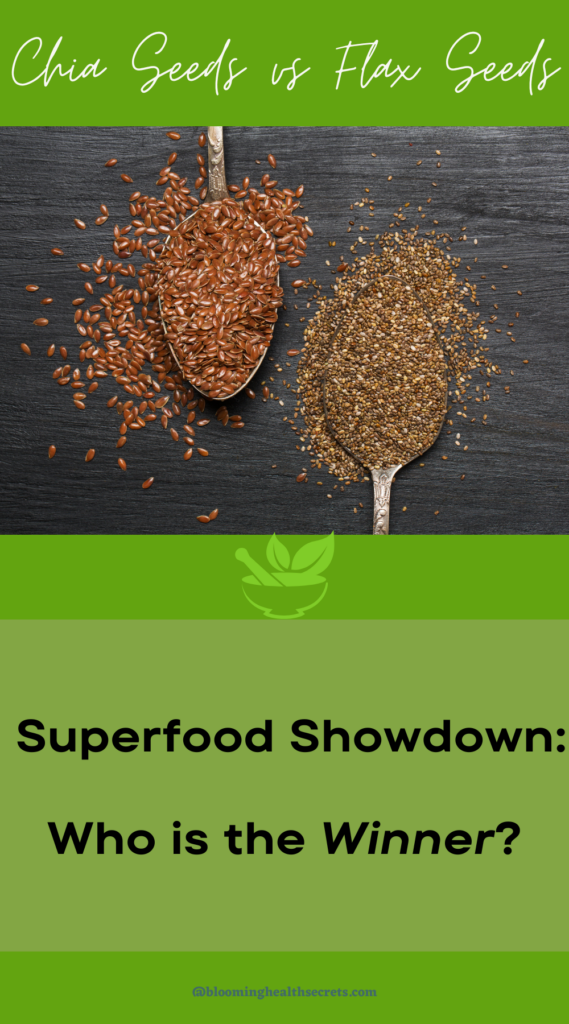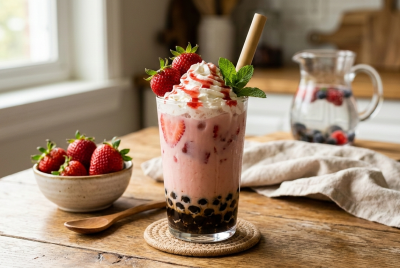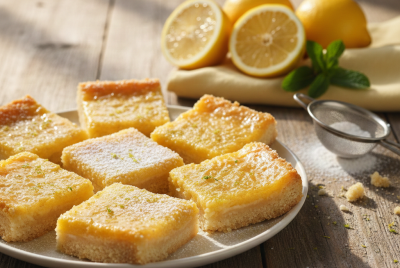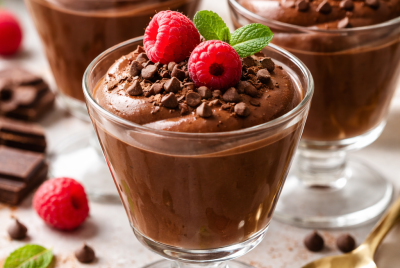Chia Seeds vs Flax Seeds: Unraveling the Superfood Showdown
Are you ready to dive into the world of tiny but mighty seeds? Chia seeds and flax seeds have been creating quite the buzz in health circles lately, touted as superfoods packed with a punch. But which one deserves the spotlight in your pantry? Let’s break it down like a friendly chia seeds vs flax seeds competition, with these tiny seeds going head-to-head in this ultimate showdown of nutritional goodness.
1. Origins and History: A Tale of Ancient Superfoods
Let’s start with a bit of history, shall we? Both chia and flax seeds have been around for centuries, revered by ancient civilizations for their nutritional benefits. Chia seeds have their roots in Central America, where they were a staple food for the Aztecs and Mayans. On the other hand, flax seeds have a history dating back to ancient Egypt, where they were prized for their medicinal properties.
2. Appearance and Texture: Seeds That Pack a Crunch
If you’ve ever seen chia seeds and flax seeds, you might notice they look quite similar at first glance. Both are small, round seeds that come in shades of brown, but a closer look reveals their differences. Chia seeds are slightly smaller and have a more uniform shape, while flax seeds are a bit larger and have a more oval shape.
In terms of texture, chia seeds have a unique quality when mixed with liquid—they form a gel-like consistency, similar to tapioca pearls. On the other hand, flax seeds have a crunchier texture, especially when they are whole.
3. Nutritional Powerhouses: The Battle of the Nutrients
Now, let’s get to the juicy (or should I say seedy?) part—the nutritional benefits! Both chia seeds and flax seeds are packed with essential nutrients, making them worthy additions to any diet.
Chia Seeds:
- Rich in fibre, chia seeds can help promote digestion and keep you feeling full.
- Loaded with omega-3 fatty acids, crucial for heart health and brain function.
- High in antioxidants, which help protect your cells from damage.
Flax Seeds:
- Also a great source of fibre, aiding in digestion and promoting a healthy gut.
- Packed with alpha-linolenic acid (ALA), a type of omega-3 fatty acid that supports heart health.
- Contains lignans, plant compounds with antioxidant properties that may have cancer-fighting effects.
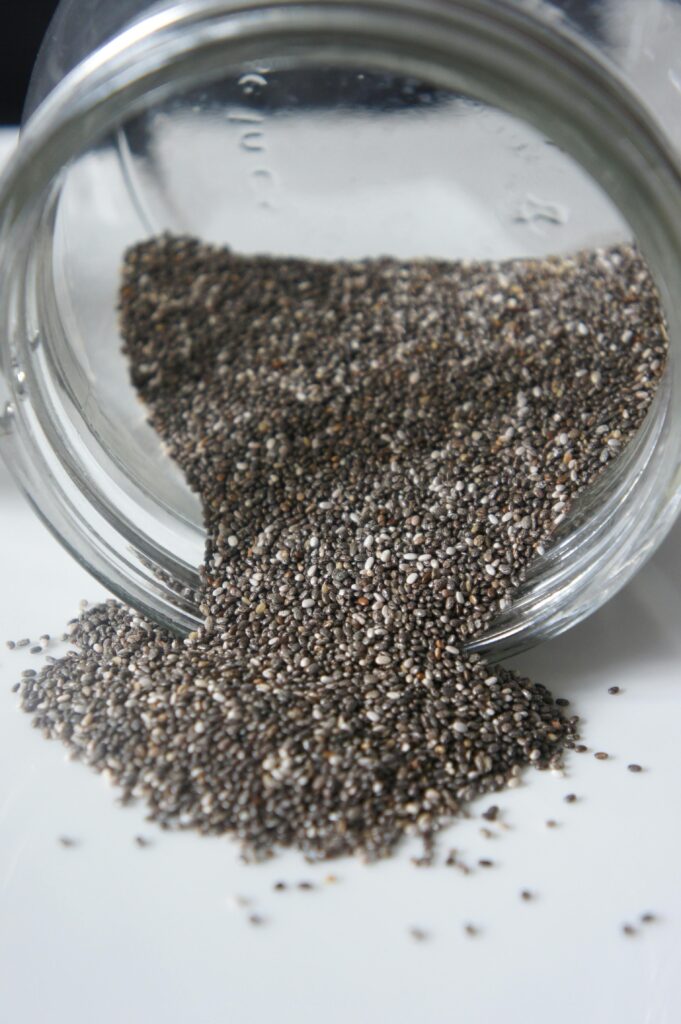
4. Omega-3 Fatty Acids Showdown: Chia seeds vs Flax seeds
When it comes to omega-3 fatty acids, both chia seeds and flax seeds shine. However, they offer different forms of this essential nutrient.
Chia seeds are particularly known for their high content of alpha-linolenic acid (ALA), a type of omega-3 fatty acid. ALA is converted into EPA (eicosapentaenoic acid) and DHA (docosahexaenoic acid) in the body, which are crucial for brain health, reducing inflammation, and supporting heart health.
On the other hand, flax seeds are also rich in ALA, making them a great plant-based source of omega-3s. Some studies suggest that the ALA in flax seeds may have benefits for heart health, such as lowering blood pressure and reducing the risk of heart disease.
5. Fibre Showdown: Chia’s Gel vs Flax’s Bulk
Fibre is essential for a healthy digestive system, and both chia seeds and flax seeds deliver in this department.
Chia seeds’ unique gel-forming ability comes from their high soluble fibre content. When mixed with liquid, they create a gel that can help slow digestion, keeping you feeling full and satisfied longer.
Flax seeds, on the other hand, are rich in both soluble and insoluble fibre. This means they can add bulk to your stool, promoting regular bowel movements and aiding in overall digestive health.
6. Antioxidant Battle: Chia’s Protection vs Flax’s Defense
Antioxidants are like the superheroes of the food world, swooping in to protect our cells from damage caused by free radicals. Both chia seeds and flax seeds are packed with these powerful compounds.
Chia seeds boast an impressive array of antioxidants, including chlorogenic acid, caffeic acid, and quercetin. These antioxidants help fight inflammation, reduce the risk of chronic diseases, and keep your cells healthy and happy.
Flax seeds, on the other hand, are rich in lignans, plant compounds with potent antioxidant properties. These lignans have been studied for their potential to reduce the risk of cancer, especially breast and prostate cancers.
7. Protein Showdown: Chia’s Plant Power vs Flax’s Protein Punch
If you’re looking to up your protein intake with plant-based options, both chia seeds and flax seeds are excellent choices.
Chia seeds are about 14% protein by weight, making them a decent plant-based protein source. They contain a good balance of essential amino acids, which are the building blocks of protein that our bodies need but cannot produce on their own.
Flax seeds, while slightly lower in protein compared to chia seeds, still pack a punch. They are about 12-18% protein by weight and provide a range of amino acids essential for muscle repair and growth.
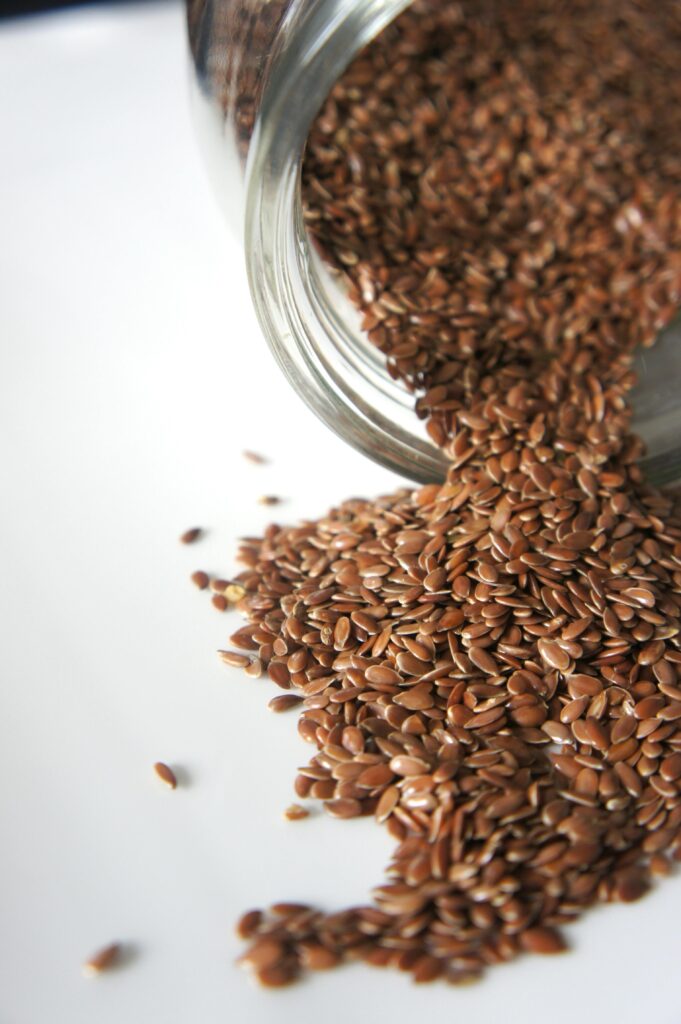
8. Nutritional Profile Showdown: Chia seeds vs Flax seeds
Let’s break it down further with a quick comparison of the nutritional profiles of chia seeds and flax seeds per one ounce (28 grams):
Chia Seeds:
- Calories: 138
- Protein: 4.7 grams
- Fat: 8.7 grams
- Omega-3s (ALA): 5 grams
- Carbohydrates: 12.3 grams
- Fibre: 10.6 grams
Flax Seeds:
- Calories: 150
- Protein: 5.2 grams
- Fat: 12 grams
- Omega-3s (ALA): 6.5 grams
- Carbohydrates: 8.2 grams
- Fibre: 7.7 grams
As you can see, both seeds offer a powerhouse of nutrients in a tiny package!
9. Culinary Versatility: Chia’s Puddings and Flax’s Egg Replacements
Now, let’s talk about how you can incorporate these super seeds into your daily meals!
Chia seeds are famous for their ability to create delicious and nutritious puddings. Simply mix them with your favorite plant-based milk, add a touch of sweetness, and let them sit overnight. You’ll wake up to a thick, creamy pudding packed with omega-3s and fibre.
Flax seeds, on the other hand, are a fantastic egg replacer in baking recipes. Mix one tablespoon of ground flax seeds with three tablespoons of water, let it sit for a few minutes to thicken, and voila! You have a vegan-friendly alternative to eggs.
10. Shelf Life Showdown: Chia’s Stability vs Flax’s Sensitivity
When it comes to shelf life, both chia seeds and flax seeds can last quite a while if stored properly.
Chia seeds have a longer shelf life due to their stable nature. You can store them in a cool, dry place for up to two years without worrying about them going bad.
Flax seeds, however, are a bit more sensitive to heat and light due to their high oil content. To extend their shelf life, it’s best to store them in an airtight container in the refrigerator or freezer. When stored this way, they can last up to a year.
11. Weight Loss Showdown: Chia’s Fullness Factor vs Flax’s Bulk Effect
If you’re looking to shed a few pounds or maintain a healthy weight, both chia seeds and flax seeds can be valuable allies.
Chia seeds’ ability to form a gel when mixed with liquid can help you feel full and satisfied, reducing the likelihood of overeating. Adding chia seeds to your meals or snacks can be a simple way to curb cravings and support your weight loss goals.
Flax seeds, with their combination of soluble and insoluble fibre, can also promote a feeling of fullness. By adding bulk to your stool and promoting regular bowel movements, flax seeds can support a healthy weight management plan.
12. Potential Side Effects: Chia’s Digestive Caution vs Flax’s Sensitivity
While both chia seeds and flax seeds offer numerous health benefits, it’s essential to be mindful of potential side effects, especially when consumed in large quantities.
Chia seeds, with their high fibre content, can sometimes cause digestive issues such as bloating, gas, or diarrhea, particularly if you’re not used to consuming fibre-rich foods. It’s best to start with small amounts and gradually increase your intake to allow your digestive system to adjust.
Flax seeds contain compounds called cyanogenic glycosides, which can release small amounts of cyanide when consumed. However, the levels are typically very low and not a concern for most people. To minimize any potential risk, it’s a good idea to consume ground flax seeds rather than whole seeds, as grinding can help break down these compounds.
13. Allergies and Sensitivities: Chia’s Gluten-Free Charm vs Flax’s Rare Reactions
If you have allergies or sensitivities, both chia seeds and flax seeds are generally well-tolerated by most people.
Chia seeds are naturally gluten-free, making them an excellent choice for those with celiac disease or gluten sensitivities. They are also free from common allergens, such as nuts and soy, making them a versatile option for many dietary needs.
Flax seeds, while rare, can cause allergic reactions in some individuals. If you have a known allergy to other seeds or nuts, it’s essential to proceed with caution when introducing flax seeds into your diet. Start with small amounts and monitor for any adverse reactions.
14. Environmental Impact: Chia’s Water-wise Nature vs Flax’s Hardy Growth
Concerned about the environmental footprint of your food choices? Let’s take a look at how chia seeds and flax seeds fare in this department.
Chia seeds are known for their water-wise nature, requiring significantly less water to grow compared to many other crops. They also grow well in diverse climates, making them a sustainable choice for farmers around the world.
Flax seeds, on the other hand, are hardy plants that can thrive in cooler climates with less-than-ideal soil conditions. They require minimal pesticides and fertilizers, further reducing their environmental impact.
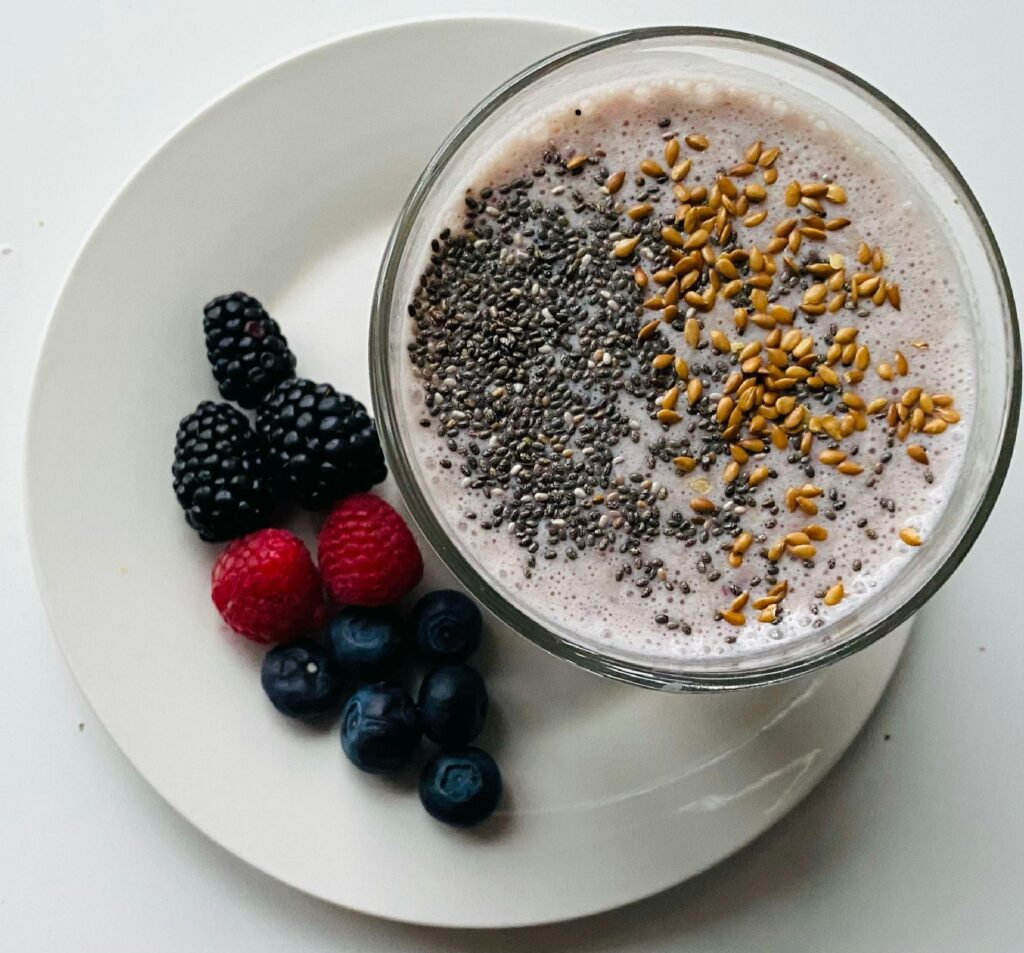
15. The Verdict: Chia Seeds or Flax Seeds? Why Not Both!
So, after this epic battle of chia seeds vs flax seeds, who comes out on top? The truth is, both of these tiny powerhouses have a lot to offer when it comes to nutrition and health benefits.
If you’re looking for a boost of omega-3 fatty acids, chia seeds and flax seeds are both excellent choices. Chia seeds might win in the fibre and antioxidant departments, while flax seeds shine in their protein content and potential cancer-fighting lignans.
In the end, why limit yourself to just one? Consider adding both chia seeds and flax seeds to your diet for a well-rounded nutritional boost. Mix them into smoothies, sprinkle them on salads, or use them in baking for a delicious and nutritious addition to your meals.
FAQs About Chia Seeds vs Flax Seeds
1. Can I eat chia seeds and flax seeds together?
Absolutely! Combining chia seeds and flax seeds can give you a diverse range of nutrients, including omega-3s, fibre, and antioxidants. Get creative with your recipes and enjoy the benefits of both.
2. Which is better for weight loss, chia seeds, or flax seeds?
Both chia seeds and flax seeds can support weight loss goals due to their fibre content and ability to promote a feeling of fullness. Experiment with incorporating them into your meals and see what works best for you.
3. Can I use chia seeds as an egg substitute like flax seeds?
Chia seeds can also be used as an egg substitute in baking! Simply mix one tablespoon of chia seeds with three tablespoons of water, let it sit for a few minutes to form a gel, and use it as you would an egg in recipes.
4. Are there any risks of consuming chia seeds or flax seeds every day?
While both seeds offer numerous health benefits, it’s essential to consume them in moderation. Eating large amounts of chia seeds or flax seeds could potentially lead to digestive issues due to their high fibre content.
5. Are chia seeds or flax seeds better for vegan and vegetarian diets?
Both chia seeds and flax seeds are fantastic additions to vegan and vegetarian diets! They provide essential nutrients like omega-3 fatty acids and protein, making them valuable plant-based options for anyone looking to boost their nutritional intake.
There you have it—the ultimate guide to chia seeds vs flax seeds! Whether you’re on #TeamChia or #TeamFlax, or maybe even both, these tiny seeds pack a big nutritional punch. So, sprinkle, blend, bake, and enjoy the benefits of these superfoods in your everyday meals!
Learn More
If you want to learn more about these two superfoods, here are some scientific articles which provide in-depth insights into the nutritional benefits, health effects, and potential uses of chia seeds and flax seeds.
1. Nutritional and therapeutic perspectives of Chia (Salvia hispanica L.): a review
This is a scientific review published in the Journal of Food Science and Technology. The review explores the nutritional composition of chia seeds, their potential health benefits, and their use in various food products.
2. Flax and flaxseed oil: an ancient medicine & modern functional food
This scientific article delves into the historical use of flaxseed, its nutritional composition, and its potential health benefits. It provides a comprehensive overview of flaxseed’s role as a functional food in modern diets.
